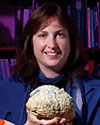Sarah Raskin, Trinity College – Prospective Memory
 On Trinity College Week: Where are my keys again?
On Trinity College Week: Where are my keys again?
Sarah Raskin, professor of psychology and neuroscience, discusses how different disorders affect memory and which treatments can be effective.
Professor Sarah Raskin graduated from Johns Hopkins in 1984 with a B.A. in Behavioral Biology and from the City University of New York Graduate Center in 1990 with a Ph.D. in Neuropsychology. She held a clinical appointment in the Department of Rehabilitation Medicine at Mount Sinai Medical Center in New York City from 1988-1991. She held a clinical appointment at Good Samaritan Neuropsychological Services and an academic appointment in the Department of Psychosocial Nursing at the University of Washington from 1991-1994. She has been a member of the faculty at Trinity College since 1994. She was board certified in Clinical Neuropsychology by the American Board of Professional Psychology in 1997.
Professor Raskin’s scholarly interests focus on investigating techniques to improve cognitive functioning after injury to the brain. In particular, she is interested in applying knowledge from studies of basic neuroscience to rehabilitation models. Her work focuses on the ability to remember intentions and ways to both identify deficits and create rehabilitation approaches for people with traumatic brain injury, stroke and disorders such as Parkinson’s disease.
Professor Raskin brings her desire to tie together knowledge from different sources to the classroom. She tries to encourage her students to look for information in many varied sources and then synthesize that into new knowledge. So students often teach class sessions, having done their own research to prepare for the lecture or class discussion. In addition, this leads to a strong community learning portion in all of her classes. In the same way that she feels basic research needs to translate to clinical applications, she tries to guide the students in bringing the basic content of her courses to the community. Thus, her classes include activities at the nearby Hartford Hospital, Institute of Living or Connecticut Children’s Medical Center, nursing homes, battered women’s shelters, clinics, lead safe houses and nearby farms with farmworkers.
Prospective Memory
Did you ever forget something you meant to buy at the store? Or leave something on the stove for too long so it burned? These examples of “remembering to remember” are called prospective memory. Prospective memory involves successfully completing something you intended to do.
Our research is focused on understanding how different disorders affect prospective memory as well as trying to design treatment techniques to improve prospective memory.
Some of the disorders we have examined include people with schizophrenia (do prospective memory deficits explain why some people forget to take their medications?); people with dementia (do prospective memory deficits serve as an early marker?); and college students (do binge drinkers have worse prospective memory than social drinkers or nondrinkers?)
But most of our work is with people who have had traumatic brain injuries. Prospective memory deficits are common and are reported to have the most negative impact on their daily lives. So we have been using techniques to help improve their prospective memory, such as visualizing what will be going on at the time they must remember, or rehearsing acting out the task. Sure many of us use electronic reminders, but for many people this technology is not practical.
We are also interested in whether our treatments are effective because of changes in brain activity. So we are doing a study now with colleagues to look at fMRI images of people doing prospective memory tasks before and after treatment. We are still learning all the best ways to change the brain but we know that the more you practice a task the better you get at doing it. So a lot of our treatment involves practice, practice, practice. And if you want to improve your prospective memory, that’s the best method we have so far.


